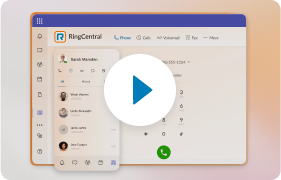Highlights:
- Contact center agents require ongoing coaching to support their performance.
- Successful coaching involves a variety of approaches, including role playing, one-on-one coaching sessions, and creating collaborative action plans.
- Cutting-edge digital software gives coaches the ability to analyze and keep tabs on agent performance.
A contact center is only as good as its agents. Optimal coaching is key to creating successful agents. How is your contact center doing in the area of coaching and agent training? Are your agents getting all the support they need?
😃 😠 😣 Your first chance to make a good impression is your only chance to make an impression 😃 😠 😣
1/3 of your customers will leave after just one bad experience! See how RingCentral contact center helped these 6 companies better serve their customers
Here are some of our most useful tips for coaching contact center agents to ensure they deliver the highest level of customer service on every call.
1. Carve out some one-on-one time with each agent
It’s true that group training is a great way to save time and resources, but it’s also true that periodically providing each agent with individual attention and coaching produces great results.
It’s these personal coaching sessions that provide the optimal time to discuss the individual performance of each agent. Issues with specific agents should never be brought up in group training sessions, but rather talked about privately in one-on-one sessions with the appropriate agent.
Contact center software that includes video conferencing capabilities can make personalized coaching sessions easier with remote workers. These digital platforms can also streamline the scheduling of private coaching sessions with all agents.
2. Assess agent performance with advanced analytics
Proactive coaching can help you head off potential problems before they become engrained in a particular agen’t performance. Leverage analytics provided by your contact center solution to assess agent performance, pinpoint potential problem areas, and address them quickly.
Be sure to use data to get the entire picture before a coaching session. For instance, suppose you notice that a a particular agent is experiencing a higher number of unsuccessful calls. Having the exact data surrounding that observation, such as the number of customer calls that went unresolved, can help you to get a better understanding of the extent of the issue at hand and have a more constructive conversation with the agent in question.
Stay informed with RingCentral
3. Provide examples to help coach agents
Coaching agents with directions and instructions may be helpful, but agents may be better able to understand your teachings with real-life examples. For instance, it may be helpful to play recordings from customer-agent calls and pinpoint what parts of the call were working and where things may have gone wrong. When possible, use the specific agent’s recordings for greater impact. Doing so allows the agent to talk through the issues with you personally and better understand how to avoid the issue in the future.
4. Involve agents in action plans
Getting agents involved in the process of coming up with an action plan to improve their performance is ideal. Action planning creates a more attainable goal and outcome and gives agents a sense of ownership of their career. Agents who are involved in creating their own action plans will also be more aware of what’s expected of them, eliminating any confusion as to next steps.

5. Use role playing to coach agents
Seeing is one thing, hearing is another, but doing it makes a lasting impression. Agents have an easier time understanding how to navigate different situations when they’re actively involved in role playing. Role playing gives agents a chance to practice the skills they’ve been taught and put them into action so they can become more efficient, effective, and comfortable on the job. Ultimately, agents will make improvements in assessing and responding appropriately to a variety of customer queries.
6. Provide timely feedback
The best time to provide feedback is immediately after a particular action is taken, whether good or bad. Real-time feedback gives supervisors the chance to address potential issues and rectify them right away and provide agents with praise when they’ve done a great job.
This is where the power of modern contact center software shines. With the right platform in place, contact center supervisors can easily keep tabs on how agents are doing and provide the right feedback at the optimal time.
7. Give targeted training
Although there is a time and place for comprehensive agent performance and review, for the purposes of coaching, it may be best to stick to one or two main points per coaching session.
Training and coaching targeted to one or two points is easier for agents to absorb and retain. Select your coaching points based on the individual needs of the agent being coached and stay on-topic during the coaching session.
Be sure to follow up with agents regarding their progress in applying the coaching they are given on each topic at regular intervals. This demonstrates to agents that the coaching is valuable and important and helps keep agents engaged and on track.
8. Encourage collaboration among agents
Official coaching comes from supervisors, but coaching can sometimes take a more informal approach. Encourage more experienced agents in the office to step in to help out fellow workers by offering some guidance and advice.Provide the tools agents need to collaborate with each other, such as video conferencing, telephone, and team messaging. A collaborative environment contributes to the success of your contact center.
9. Establish benchmarks using analytics
As noted, analytics play an essential role in successful coaching. Contact center supervisors should leverage analytics to measure agent performance, but just as importantly, to set specific criteria and benchmarks for agents to attain. With clearly defined goals, agents are more likely to be engaged and productive in their work.
10. Remove roadblocks
Effective coaching of contact center agents involves more than setting goals and measuring benchmarks, however. It also involves looking for roadblocks – obstacles that your agents encounter that make their jobs more difficult or impossible to do. As you discover these obstacles, design ways to work through or around them, and clue your agents in on strategies to do so.
Make agent coaching easier with RingCentral
RingCentral offers contact center solutions that help supervisors coach agents effectively. From video conferencing and team messaging to advanced contact center analytics, RingCentral has the tools you need to build better agents.Get started by requesting your free demo today.
Updated Jun 20, 2024












